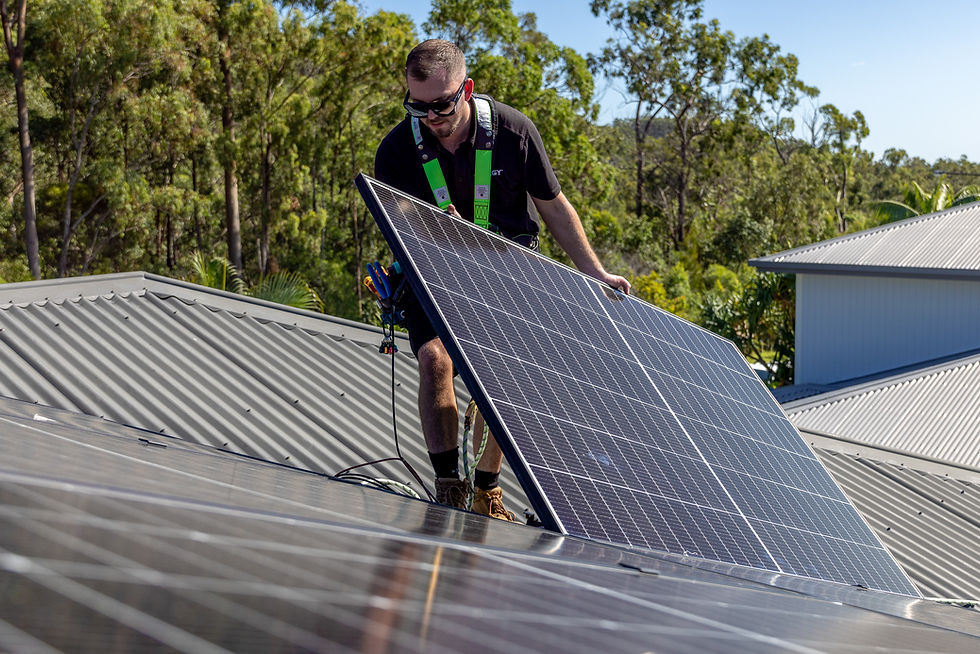Your guide to off grid solar systems
- Lochie Burgdorf
- Jul 27, 2025
- 3 min read
Updated: Jul 28, 2025

Why 2025 is the year to go off grid
Off grid solar systems is a self-sustaining power solution that is not connected to the electricity grid. For everyday Australians, whether in rural, regional, suburban or urban areas, off grid living is becoming more accessible and rewarding.
In 2025, going off grid is more practical and affordable than ever before. With generous government rebates, rising electricity prices and cutting-edge solar and battery technology, now is the ideal time to take control of your power.
Why choose an off grid solar system in Australia
Freedom from rising electricity bills
Protection from blackouts and grid instability
Enhanced environmental sustainability
Independence from utility companies
Rebates and incentives available to offset upfront costs
Off grid systems offer both long-term savings and independence with a more reliable and controlled energy experience.
How off grid solar systems work
An off grid solar system generates electricity using solar panels during the day and stores any excess power in batteries for use at night or during cloudy weather. The inverter converts the stored DC electricity into usable AC power for your home. A charge controller manages battery charging safely to prevent overcharging or damage. If the batteries run low, a backup generator can automatically supply power to keep everything running without interruption.
A typical system includes:
Solar panels to generate electricity
Battery storage to store excess energy
Inverter and charge controller to convert and regulate power
Backup generator for emergencies
Monitoring system for real-time usage tracking
What’s new in off grid solar in 2025
Federal Battery Rebate launching in July 2025 — offering up to $4,000 on eligible systems
Smarter Batteries such as Sigenergy lithium systems — high efficiency, long lifespan, intelligent energy management
Advanced Inverters from Sigenergy, Victron and Selectronic — hybrid operation, blackout protection, remote monitoring
STC Rebates Still Available through 2025 — reducing annually until 2030
These innovations make off grid living more reliable, efficient and user-friendly than ever before.
Planning tips for everyday Australians
Know your daily power usage in kilowatt-hours (kWh)
Ensure your property has adequate sun exposure and space for panels
Opt for lithium-based battery storage for durability and efficiency
Include a backup generator for peace of mind
Use your system’s app to monitor energy production and use
Work with a certified installer to access rebates and ensure quality
Step by step: How to set up an off grid solar system
Step 1: Calculate your daily energy use
Review past electricity bills or use an energy usage calculator to estimate daily consumption. Make sure to add a buffer for seasonal changes and new devices.
Step 2: Choose the right system size and battery bank
Select a solar array and battery bank sized to meet your daily energy needs with capacity for two to five days of storage for reliability through cloudy stretches.
Step 3: Make sure you use a qualified installer
Only work with Clean Energy Council (CEC) accredited installers to ensure proper design, safe installation and eligibility for rebates. At Nergy, our certified team ensures smart, reliable systems.
Step 4: Discuss rebates with your installer
Talk through eligible incentives, including federal STCs and the Battery Rebate, with your installer. These rebates are typically applied in your quote, saving time and hassle.
Step 5: Schedule installation and system testing
Coordinate installation, system testing and app setup with your installer. Make sure protective features like surge guards and generator compatibility are in place.
Step 6: Monitor and maintain the system
Use your solar system’s app to check performance, battery status and usage. Shift appliance use to daylight hours and clean panels every six to 12 months. Schedule regular system health checks.
Step 7: Contact Your Installer for Ongoing Support
If any issues arise, including alerts, performance changes or questions, reach out to your installer. Nergy offers a satisfaction guarantee for ongoing support, ensuring peak performance throughout the system’s life.
FAQs about off grid solar in Australia
Can I go fully off grid anywhere in Australia?Yes. Even households in highly populated areas are now going off grid — not just rural or remote properties.
Do I still need a generator?Yes, a generator is recommended for backup during extended cloudy periods or peak winter use.
How long do solar batteries last?Modern lithium batteries typically last 10 to 15 years with minimal maintenance.
Is off grid solar right for you?
If you want energy independence, long-term savings, and reduced environmental impact, an off grid solar system in 2025 is a smart investment. With cutting-edge tech, strong rebates and trusted installers like Nergy, it’s never been easier to go off grid.
Ready to take the first step? Contact Nergy to explore your options and start planning your off grid system today.


Comments